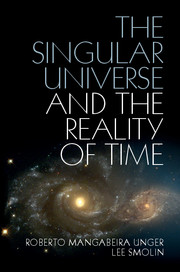Book contents
- Frontmatter
- Contents
- The nature and scope of this work
- Part I Roberto Mangabeira Unger
- Part II Lee Smolin
- 1 Cosmology in crisis
- 2 Principles for a cosmological theory
- 3 The setting: the puzzles of contemporary cosmology
- 4 Hypotheses for a new cosmology
- 5 Mathematics
- 6 Approaches to solving the meta-law dilemma
- 7 Implications of temporal naturalism for the philosophy of mind
- 8 An agenda for science
- 9 Concluding remarks
- Acknowledgments
- References
- A note concerning disagreements between our views
- Index
4 - Hypotheses for a new cosmology
Published online by Cambridge University Press: 05 December 2014
- Frontmatter
- Contents
- The nature and scope of this work
- Part I Roberto Mangabeira Unger
- Part II Lee Smolin
- 1 Cosmology in crisis
- 2 Principles for a cosmological theory
- 3 The setting: the puzzles of contemporary cosmology
- 4 Hypotheses for a new cosmology
- 5 Mathematics
- 6 Approaches to solving the meta-law dilemma
- 7 Implications of temporal naturalism for the philosophy of mind
- 8 An agenda for science
- 9 Concluding remarks
- Acknowledgments
- References
- A note concerning disagreements between our views
- Index
Summary
In Chapter 1, we surveyed the experimental and observational situation in cosmology and proposed five principles which we believe must constrain the construction of any properly cosmological theory:
The principle of differential sufficient reason.
The principle of the identity of the indiscernible.
Explanatory closure.
No unreciprocated action.
Falsifiability and strong confirmability.
Having set the scene, we now propose three hypotheses which we suggest should guide the discovery of a cosmological theory which satisfies these principles. I will state the hypotheses and then discuss each in turn.
The uniqueness of the universe.
The reality of time.
Mathematics as the study of systems of evoked relationships, inspired by observations of nature.
Someone might call these also principles, but I want to stress that the first two are hypotheses about nature, which might be confirmed or disconfirmed as science progresses. They have force because they suggest different kinds of experiments and different results than approaches which deny them or embrace hypotheses which conflict with them.
Now I elaborate on each of these.
- Type
- Chapter
- Information
- The Singular Universe and the Reality of TimeA Proposal in Natural Philosophy, pp. 414 - 421Publisher: Cambridge University PressPrint publication year: 2014

